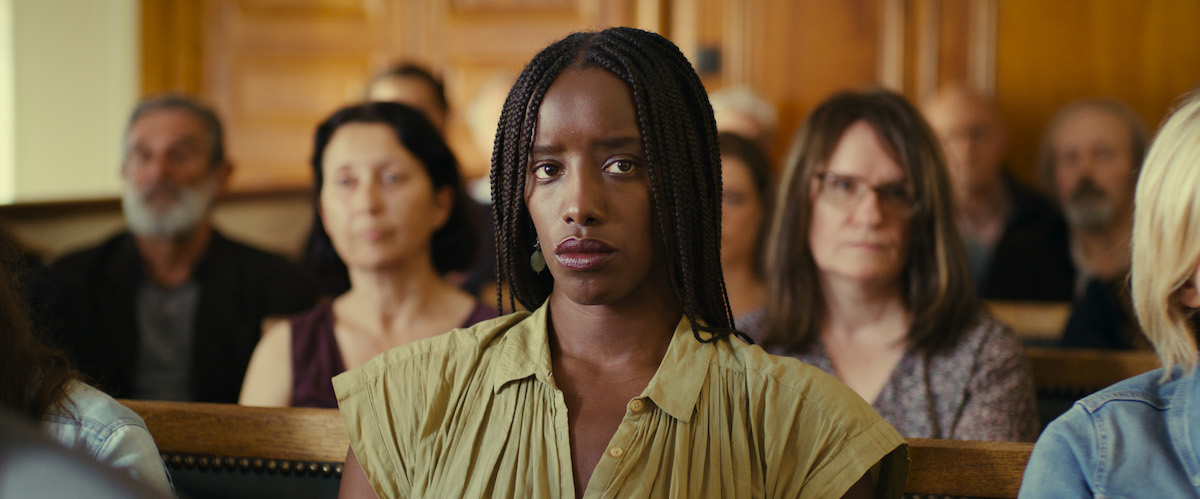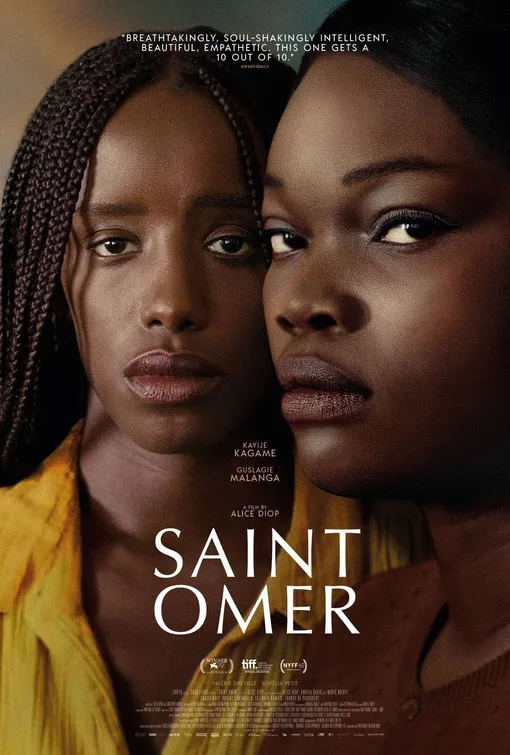In 2016, the accomplished documentary filmmaker Alice Diop, sat in the courtroom in the town of Saint-Omer, listening to the chilling testimony of Fabienne Kabou, a French-Senegalese woman accused of killing her infant daughter. Kabou breast-fed the baby before placing her on the sand of the Berck-sur-Mer beach, leaving her to drown in the rising tide. Why did Kabou do such a thing? Kabou’s answers (“It was simpler that way”) were ambiguous and ultimately unsatisfying, at least in terms of determining motive. Kabou was examined by psychiatrists and was declared paranoid but well enough to stand trial. Kabou spoke of evil forces threatening her baby. Diop, born to Senegalese parents, and pregnant at the time, was drawn to attend the trial almost like a magnetic force. Kabou’s testimony made Diop reflect upon her own life, her mother, her impending motherhood, as well as the experience of being “othered” in the land of her birth. “Saint Omer,” Diop’s first narrative feature, is the result of this powerful personal experience. And what a powerful film it is.
What does Kabou’s story have to tell us? What messages are being conveyed? In her film, Diop staunchly does not answer these questions. Instead, “Saint Omer” just presents the questions, although there is nothing “just” about this approach. In presenting the questions, and in presenting the swirls of empathetic identification between Rama (Kayije Kagame), attending the trial, and Laurence (Guslagie Malanga), the accused woman in the dock, Diop allows the film to resonate with anxieties, confusion even, and the undertow of subterranean influence. We don’t always know why something has an impact on us. For an artist, it is enough to know the depths have been stirred. Diop told Variety, “I wanted to recreate my experience of listening to another woman’s story while interrogating myself, facing my own difficult truths. The narrative had to trace a series of emotional states that can lead to catharsis. It’s like accelerated psychotherapy.”
Rama, a novelist and professor, is first seen lecturing on Marguerite Duras (whose influence on “Saint Omer” is felt in its provocative silences, its centralizing of women, and its interest in what goes on in the so-called margins). Rama is an accomplished woman, in a happy relationship, with a baby on the way. She is researching her upcoming book, a modern version of Medea. In Saint-Omer, another narrative is unfolding, one with Medea-like echoes. Perhaps telling herself it’s all for research, but in reality not really knowing why, Rama packs a small suitcase and travels to the town. She sits in the courtroom, watching Laurence walk to the stand, a solitary figure, no family present, no connections to the world around her. Rama’s act of looking is our act of looking. But there are times when Rama’s listening face is our most direct “way in.” Laurence tells her story in a forthright manner, even as the answers express trauma, terror, and ambivalence. The judge (Valérie Dréville) seems interested in getting to the bottom of what the hell happened here but remains baffled at some of Laurence’s answers. The sense of Laurence as “other,” as something outside the “normal” realm of French life, is in the courtroom’s air. Prosecutors interrogate and push, defense attorneys step in. Much of the screenplay was taken from the actual court transcripts of the original trial.
To describe what occurs in “Saint Omer” is, in a way, to deprive it of its electrifying charge. Cinematographer Claire Mathon (who also shot “Portrait of a Lady on Fire“) vacillates between a clear (yet beautiful) style—no stylistic flourishes to detract from Laurence’s testimony and Malanga’s riveting performance—and a more impressionistic style, weaving together dream-space flashbacks, home movie footage, all as Rama’s emotional life disintegrates, alone in her hotel room, bombarded by emotions about the baby in her womb, memories of her own mother, and the experience of being an outsider (even though she was born in France). Kagame’s work in these scenes is poignant and painful. The true crime aspect bleeds into the personal, and the personal is brought back into the courtroom. The two-way flow is the rhythm of “Saint Omer,” making the film the opposite of a sensationalistic portrayal of a real-life crime.
Diop’s documentaries (particularly the award-winning “We”) detail the lives of immigrant communities, those “unseen” by the mainstream, those considered not a part of French national life, be it political, social, or cultural. Her decision to film “Saint Omer” not as a documentary but as a narrative feature went far beyond the ban on cameras in the courtroom. What interested her was not just the case, but her reaction to the case. She told W Magazine that she looked around the courtroom and noticed most of the attendees were women. What were women finding in this story? What answers were they seeking? Diop told Slant Magazine, “I don’t understand [Fabienne Kabou], because I didn’t understand her at the trial, and I still don’t understand her now. And because I don’t understand her, that makes me ask questions about myself.”
The fascination with true crime is not a recent phenomenon, although it is seeing a particular renaissance right now. Diop consciously uses the many tropes of true crime documentaries, while at the same time up-ending them. In doing so, “Saint Omer” becomes a much larger reflection on contemporary French life, the experience of immigrants, and the shadows we drag along with us as we move into a different space. Diop has spoken of her admiration for Truman Capote’s In Cold Blood, because it’s not just about the crime, it’s about the world surrounding the crime, the flow of American culture that helped create cold-blooded murderers like Dick Hickock and Perry Smith. Asking “why did this happen?” is almost irrelevant in the face of all the evidence.
Fabienne Kabou came to France from Senegal to attend university, and her thesis studies focused on the philosopher Ludwig Wittgenstein. In “Saint Omer,” when Laurence discloses this to the court, she is met with open disbelief, even more disbelief than the reaction to her crime. The judge, and the lawyers, can’t fathom why an immigrant from Senegal would be interested in an Austrian philosopher born in the 19th century. Their incomprehension is deeply insulting to anyone with intellectual curiosity and an interest in learning outside the scope of personal experience. They all think she’s lying about her thesis topic. Perhaps the judge and lawyers are unfamiliar with Wittgenstein’s focus on the limits of language, expressed in his famous: “Whereof one cannot speak, thereof one must be silent.”
Alice Diop understands how silence, when allowed to exist, vibrates with echoes, and it is these echoes that are trying to speak to us. They have a lot to say. “Saint Omer” shows us how to listen.
Now playing in theaters.




















